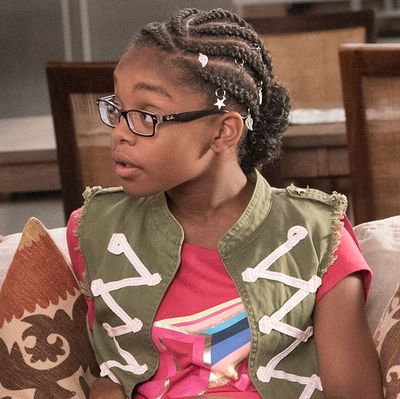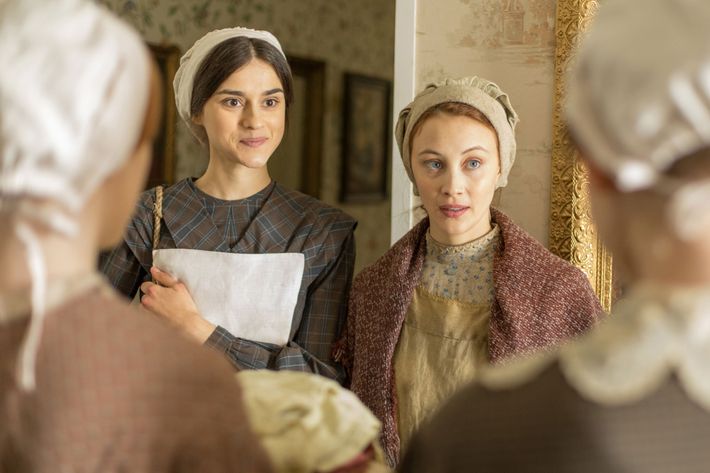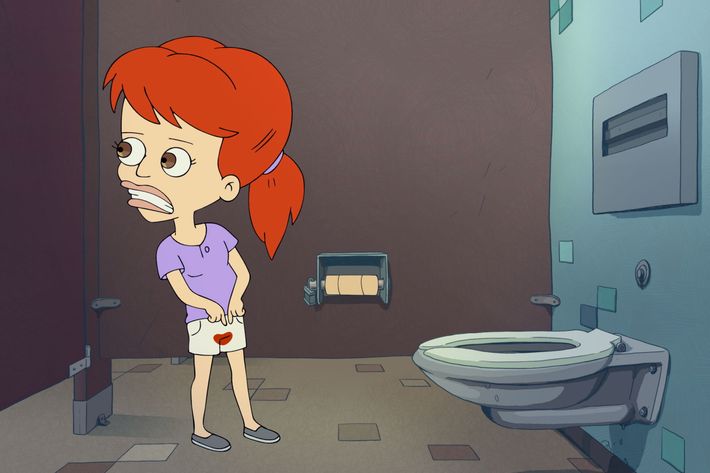
When Diane got her period in last week’s episode of ABC’s Black-ish, she joined a relatively small but growing group of preteen characters whose rite of menstrual passage has been commemorated in an episode of television.
Historically, menstruation has not been discussed all that often on scripted TV. Back in the early ’90s, Blossom Russo — whose inaugural visit from Aunt Flo occurred in the second episode of Blossom — became a member of the same group Diane just joined. So did Lucy and Ruthie of 7th Heaven — not to be outdone by Blossom, Lucy got her period in the very cringe-y, very first episode of the WB drama — and also Sally Draper, whose trip to a museum with good ’ol Glen in Mad Men was rudely interrupted by the beginning of her cycle. Even Rudy Huxtable got her first period in an episode of The Cosby Show that aired almost 27 years, to the date, before that Black-ish episode was broadcast. Since Black-ish is reminiscent of The Cosby Show in ways both minor and super-intentional, that connection seems more than merely coincidental.
Lately, television has been riding the crimson wave with greater frequency. Within the past two years alone, Broad City, Inside Amy Schumer, Crazy Ex-Girlfriend, and Better Things have all addressed that time of the month, often using rather graphic language. (Crazy Ex-Girlfriend managed to address the shedding of the uterine wall both crudely and melodically, courtesy of the song “Period Sex.” Because crude, melodic, and uterus-related is basically Crazy Ex-Girlfriend’s official brand.) But the past few weeks have been a particularly relevant time for honest explorations of a girl’s biological transformation into a woman. In addition to Black-ish, episodes of Alias Grace and Big Mouth have also depicted the confusion and shock that accompanies the first instance of menstrual bleeding. But unlike some older TV shows — again, I point you to to 7th Heaven — all three of these shows connect the arrival of a girl’s period with the awakening of strength and female rage. (It’s worth noting that all of these episode were written by women, and the episodes of Black-ish and Alias Grace were directed by women as well.)
On Black-ish, the experience that Diane (Marsai Martin) has with her period mirrors the one Rudy had on The Cosby Show nearly three decades before. Diane initially rejects her eager mother’s interest in engaging on the topic and asserts her independence by handling things herself, but eventually caves in and allows her mom, Rainbow (Tracee Ellis Ross), and the other women in the Johnson family to celebrate the occasion. First, they tell her horror stories about their own experiences — Rainbow’s mother Alicia (Anna Deavere Smith) says that her mom kept her home from school when she got her period because it meant she was “dirty” — but then they lighten the moment by emphasizing the positives of being a woman. “It’s a gift from Mother Gaia,” Alicia says. “It means that you can make life.”
This is very similar to the tenor of the conversation Clair Huxtable (Phylicia Rashad) had with Rudy (Keisha Knight Pulliam) in that Cosby Show episode, right down to the horror stories: Clair actually says that when she was a girl, periods were called “the horror.” As Black-ish did, the Cosby episode also notes that this milestone means something beautiful: that Rudy can someday have her own children. For obvious reasons, it feels wrong to laud any episodes of The Cosby Show these days. But I have to say it’s pretty remarkable that it addressed both the positives and negatives of this specifically female experience in a way that still feels pretty honest 27 years later, while also providing a foundation that Black-ish could build on and run with in its own way. (Also, Clair Huxtable was, is, and will forever remain a queen, so much so that when Blossom got her period on her show a few months later, she had a fantasy conversation about it with a TV mom … played by Phylicia Rashad.)
That said, Black-ish does something that The Cosby Show and Blossom did not: It hints at how this rite of passage can become a gateway to female empowerment.
The first thing that Bow and Dre (Anthony Anderson) notice about their daughter as the big moment approaches is that she’s even more fiery than usual, to the point that they are actually frightened of her. On one hand, this plays into stereotypes about women becoming extra-moody during that time of month — stereotypes that the aforementioned episode of The Cosby Show actually went out of its way to delegitimize. But it also taps into the notion that the first period doesn’t just enable a girl to transform from baby into potential babymaker. It also begins to give her a certain sense of power. To borrow a headline from Lindy West’s New York Times column that ran last week, it makes her start to feel brave enough to be angry. Or in Diane’s case, brave enough to be angrier.
The two Netflix series Alias Grace and Big Mouth get at this idea even more directly. (Note: There will be spoilers ahead.)

In the second episode of Alias Grace, we see a young, naïve Grace Marks (Sarah Gadon) realize she’s gotten her first period, but because her mother is dead and she knows little about how reproduction works, she is terrified and thinks she must be dying. Unlike a mainstream network show like Black-ish, Alias Grace does not shy away from showing us the blood that Grace discovers, causing her to scream in terror. Still, her best friend Mary Whitney (Rebecca Liddiard) is able to talk her down and provide a version the kind of female-bonding moment that Diane’s family provides for her, albeit one steeped in much more practical advice. Mary doesn’t say some form of, “Yay, you can make babies now!” Instead, she cautions Grace that becoming a woman means she has to look out for herself with even greater vigilance, especially around men.
“Soon you’ll start to turn men’s heads,” Mary says. “The worst will be the gentlemen, because they think they’re entitled to anything they want. They’ll start promising you things, they’ll say, ‘I’ll do whatever you want.’ But you must be very careful and you must never do anything for them unless they have performed what they promised.”
It is this conversation, as well as the abortion Mary Whitney is later forced to have, that lights a fuse in Grace that eventually ignites a life-altering resentment toward her boss, Nancy Montgomery (Anna Paquin), and master Thomas Kinnear (Paul Gross). In Alias Grace, becoming a woman isn’t just a sweet rite of passage. It’s the moment when a girl starts to realize that men, and society, do not treat members of her gender with the respect they deserve. It’s the moment when Grace first starts to understand that life is different for women, and the moment when she starts to feel really pissed off about that.

Big Mouth captures all of those feelings about the first period in a way that is even more blunt and relatable than any TV portrayal I can remember. In its second episode, “Everybody Bleeds,” Jessi, voiced by Jessi Klein, is blindsided by her first period in a classic middle school worst-case scenario: while on a school field trip to the State of Liberty, and while wearing white shorts, and while in a bathroom with no feminine hygiene products or toilet paper to absorb the situation.
The episode captures the harshness and surreality of the moment in a way that only animated series can. Jessi imagines having “the talk” with the actual Statue of Liberty (“Being a woman is misery,” the Statue says in a French accent, while smoking a cigarette. “Nothing but pain and unwanted babies from terrible lovers, and worst of all — le cramp.”) Later, on the bus ride home, she imagines a tampon who sounds remarkably similar to Michael Stipe, singing a song called “Everybody Bleeds” that sounds a lot like R.E.M.’s “Everybody Hurts.”
Instead of turning the milestone into something warm, fuzzy, and empowering, Jessi’s mom (Jessica Chaffin) acknowledges that having a period is definitely unfair: “You know, if men got their period, it’d be an Olympic sport. They’d give out medals for the heaviest flow.” The way Big Mouth captures the crushing sense of injustice that comes with being forced to use Maxi Pads gets closer to anything I’ve seen or read to capturing how it feels — or at least how it felt for me — to go through this experience. (My mother couldn’t even say the word period out loud. Whenever she brought up the monthly visitor, she referred to it as being “messed up.” Which is … pretty messed up?)
Jessi’s period also introduces her new invisible best friend, the Hormone Monstress (Maya Rudolph), who informs Jessi that, as a young woman, it’s now her duty to listen to Lana Del Rey on repeat, cut up all her T-shirts, and “scream at your mother and then laugh at her tears.” Which is exactly what Jessi does: “Get the hell out, Shannon!” she shouts at her mother the second she tries to enter her room. “I SAID GET OUT!!!”
Sure, this is immature, preteen anger. But just as it was for Diane on Black-ish and Grace on Alias Grace, it’s also anger born out of the realization that life is going to be harder simply because you were born with a pair of X chromosomes. It’s also the same anger that, with maturity, can morph into something else: a grit and determination that equips women to do things like standing up to their abusers, running for president, or deciding to seek public office after reading an offensive meme — and then actually beating the guy who created that stupid meme.
All of these shows convey, to varying degrees, that getting your period just plain sucks. But at a particularly significant moment, they’re also saying that the anger and frustration brought on by that first blood may give women a specific type of inner fire men can never know. In other words, being a woman is indeed a gift from Mother Gaia, but not just because it means you can create life. It’s also a gift because it makes you a life force.





